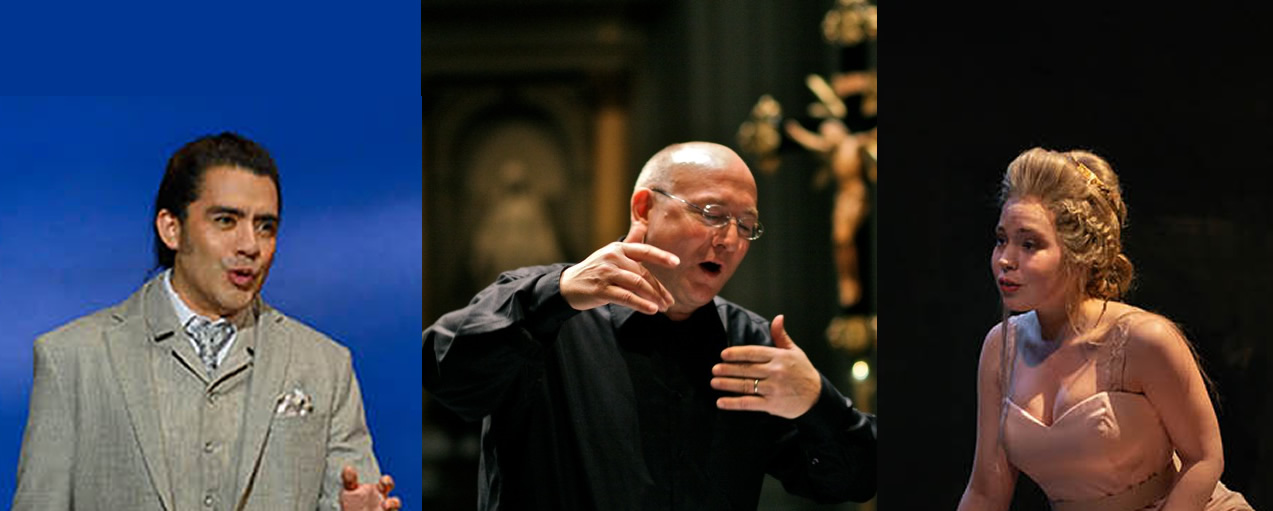The A.J. Fletcher Opera Institute at the University of North Carolina School of the Arts mounted the opera Rodelinda, Queen of the Lombards by George Frideric Handel (German, 1785-1857, born Georg Friedrich Händel) in the Agnes De Mille Theatre Tuesday night. The student cast and orchestra ventured into the Baroque aesthetic with energy and enthusiasm. In the pit, leading the small orchestra, was Grammy Award-winner Steven Stubbs, a Baroque opera specialist. The work was sung in Italian with English supertitles.
Rodelinda (libretto by Nicola Haym) premiered in 1725 at the King’s Theatre in the Haymarket, London. It is recognized as one of Handel’s finest works. The opera concerns love, power, treachery, fate…, the usual Baroque fare. Like so many operas of this period, the plot is convoluted.
Rodelinda (soprano Claire Pegram, double cast Eliza Mandzik), and her silent son, Flavio (Viktoria Wilmot) have been taken prisoners by Grimoaldo (sung by tenor James Smidt, double cast with Wagner Pástor), who has usurped the throne of Milan, formerly belonging to Bertarido, King of Lombardy (countertenor Taylor Mason Boone). Bertarido has fled the city and circulated rumors that he is dead. As rumors of his death circulate, Grimoaldo plots how to legally take possession of the throne. Bertarido has different plans: rescue his wife and son from Grimoaldo.
The Overture served as a musical backdrop to the first act, a pantomime. Rodelinda and Flavio visit the supposed grave of Bertarido. Other characters arrive in a kind of presentation of the cast. The second act, taking place in Rodelinda’s apartment, reveals the Queen mourning the loss of her husband. The usurper Grimoaldo enters and declares his love for her. She angrily spurns his advances.
Here Pegram spun out long lines, revealing a strong, passionate, and distinctive presence.
Enter Eduige (sung by mezzo Brennan Martinez), Bertarido’s sister, who was formerly betrothed to Grimoaldo. Smidt, robustly singing throughout the night, tells her he will not marry her, spurning her as she had previously spurned him. Grimoaldo’s “friend” Garibaldo (sung by baritone Andrew René) falsely professes love for Eduige, who promises to return his love after she wreaks revenge on Grimoaldo.
René’s hearty bass voice provided a dark, evil foil to the proceedings. Martinez’s singing brought forth a rich contralto voice, full of fire and drama.
Kathleen Felty, singing the pants role of Unulfo, friend to Bertarido, was warm and moving. Taylor’s soaring and ardent singing was a delight to hear. One show stopping scene was the heart-rending duet between him and his Queen (Pegram). This farewell duet intertwines the two singers’ gorgeous voices. Other cast members included Katherine Ledbetter as Nurse Maid to Flavio; Jalen Hicks and Evan King as agents to Grimoaldo; and Carson Weddle and Keegan Welford-Small as Servants of the House of Rodelinda.
The de Mille Theatre is small and congenial. The acoustics are a bit dry, which occasionally deadened the singers’ ringing sounds. Stage director Steven LaCosse‘s handling of the action was simple but effective. The set, designed by Manika Gupta, was terrific – a wall with four openings that could be promenade entrances, jail bars, or closets. The wall broke into two halves to create a large stage or a diagonal garden wall. Effective lighting by Clara Ashe-Moore spotlighted the principals nicely. Costumes, curiously hearkening to the early 1800s(?), were designed by Melissa Thurn. Musical preparation was in the hands of Angela Vanstory Ward and PG Hazard; the production stage manager was Emily Kritzman.
Stubbs’ conducting of members of the UNCSA Symphony Orchestra was first-rate. Obviously, a master of Baroque style, the director was with the singers every step of the way. His allegro tempos were brisk, the slower ones pulled at one’s heart strings. Infrequent tuning issues did nothing to detract from the ensemble’s energy. There was a harpsichord in the pit (played by Hazard), although I couldn’t hear it.
Another oddity: Stubbs accompanied the recitatives on a synthesizer that was programmed to sound like a piano. The three-hour opera is full of mistaken identities, jealous suspicions, and problematic relationships, all of which come out right in the end with only one death. Those who know Handel’s music only from Messiah or Water Music would be well-advised to experience the drama in the composer’s “other” music. This score is magnificent, and this staging is honestly and forcefully presented.
This opera repeats at 7:30 p.m. on Thursday, April 18, and at 2 p.m. Saturday, April 20. See our sidebar for details.












